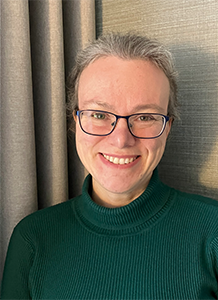Professor Helen Sneddon
01904 322840
Email: helen.sneddon@york.ac.uk
Helen Sneddon is Professor of Sustainable Chemistry and Director of the Green Chemistry Centre of Excellence (GCCE) – a leading international academic facility for the provision of excellence in green and sustainable chemical technologies, processes and products.
Research
Research in the Sneddon Group spans the GCCE’s 4 themes of renewable feedstocks, green synthesis, sustainable technologies and design for sustainable reuse/degradation/recovery.
Renewable Feedstocks
Building on the GCCE’s proud research track-record of valorisation of biobased feedstocks into chemicals, we are interested in producing biobased monomers, and in generating diverse arrays of structures from biobased platform molecules.
Green Synthesis
We are interested in helping chemists choose the “greenest” conditions for a given application or synthetic transformation. How do we know which conditions are better? This can include a comparison of metrics, and use of statistical methods, for example, Design of Experiments (DoE) to scope reaction space, and the development and application of solvent and reagent selection guides.
This work seeks to overcome years of precedent as to what are the default conditions for common transformations. It is easy for precedence to build simply because of previous publication, and defaults in many cases did not arise through proper optimisation of what was available at the time, far less take new solvents, reagents or technologies into account.
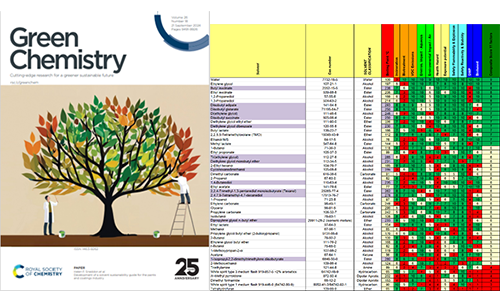
Sneddon et al. Green Chem, 2024, 26, 9697-9711.
Sustainable Technologies
Building on previous work in the GCCE (North et al. Green Chem. 2017, 19, 952–962) we are exploring greening coupling conditions and protecting group strategies compatible with greener solvents for solid phase peptide synthesis.
Design for sustainable reuse/degradation/recovery
We are interested in whether carbon-halogen bonds, for example in pharmaceuticals and agrochemicals, are always necessary. When they are, we are interested in how they can be installed as sustainably as possible. Of the top 200 best-selling drugs in 2020, 47 contain halogens, showing their current important role. Challengingly, we are interested in whether we can improve design for degradation.
Helen Sneddon is co-director of two centres for doctoral training: the Process Industries: Net Zero (PINZ CDT) joint with Newcastle University, and the Chemical Synthesis for a Healthy Planet (CSHP CDT) joint with the University of Oxford.

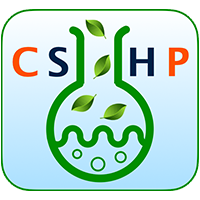
Group members
Helen Sneddon Group Members

Zameer Ashrif
Zameer graduated from the University of Warwick in 2025 with a Masters in Chemistry. For his MChem research project, he investigated the use of anionic polymerisation for the synthesis of bio-based surfactants under the supervision of Professor Stefan Bon and Professor Dave Haddleton. For his PhD, Zameer is co-supervised by Professor Helen Sneddon and Professor Antoine Buchard within the Synthomer Prosperity Partnership. His PhD research focuses on the development of bio-based monomers for defossilisation of the polymer industry. In his spare time, Zameer enjoys travelling, history, and playing the saxophone.

Hannah Chapman
I am a PhD student working with Professor Helen Sneddon and Professor Ian Fairlamb to explore potential trifluoromethyl bioisosteres using agrochemically relevant trifluoromethyl pyridines. My research involves working alongside Syngenta to synthesize a wide library of trifluoromethyl bioisosteres to be assessed in terms of calculated and measured properties to investigate any possible trends that may result in bioactivity. In my free time I also like to play softball and baseball for the University or go for hikes in the countryside.

Ben Coles
I’m a PhD student working under the joint supervision of Professor Helen Sneddon and Dr Chris Spicer. My research project in looking at the use of propylene carbonate-based solvent systems for solid-phase peptide synthesis. I completed my undergraduate degree at the University of Glasgow. This was then followed by a master’s degree at the University of Edinburgh, during which I undertook a project in the Lawrence Group, under the supervision of Dr David Jones, investigating the generation of phosphorus-stereogenic centres.
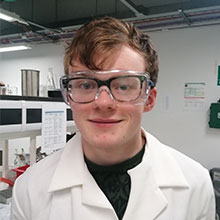
Callum Dutton
I am an MChem student under the day to day supervision of Hannah Chapman. I am researching metal-free synthesis of isoquinolinones and I like going to the gym in my spare time.
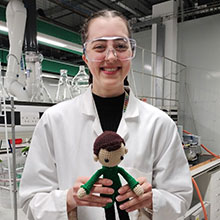
Megan Goss
I am a PhD student supervised by Professor Helen Sneddon and Professor Avtar Matharu, sponsored by Syngenta. My research involves the synthesis of potential agriculturally-relevant molecules, building them from bio-derivable starting materials. I completed my MChem at York in 2023, with my final year project supervised by Professor Sneddon, working on greener methodologies for deoxychlorination reactions. In my free time, I enjoy crocheting (especially chemistry-themed items) and I am a member of the university trampolining team.

Kirsten Hawkins
I am a PDRA working with Professor Helen Sneddon on the prosperity partnership. My research involves the synthesis of lactone monomers for sustainable polymers. I studied for my undergraduate degree (MChem) at the University of Reading before carrying out my PhD at the University of York in prebiotic chemistry under the supervision of Professor David K Smith and Professor Paul A Clarke, where I developed a novel two-component hydrogel. I briefly took up a PDRA role at UCL looking at liposomal delivery for treatment and theragnostic of acute myeloid leukaemia under Professor Alethea Tabor. I moved back up to the University of York in 2021 joining Dr Thomas Farmer in the development of Furan Surfactants.

William Heamen
I am a PhD student supervised by Professor Helen Sneddon and Dr Seishi Shimizu. I am working towards developing safer alternatives for acetonitrile, methanol, pyridine, and trimethylpentane. Currently, my work has a particular physical chemistry focus on adsorption isotherms and their modelling to better understand HPLC solvents. I completed my undergraduate degree at the University of York within the Green chemistry group studying deep eutectic solvents under the supervision of Dr Seishi Shimizu.

Harry Maslen
I am a PDRA working on the Synthomer Prosperity Partnership. I previously did my PhD in the group looking at “Bio-based coalescing aids for paints and coatings”, synthesising compounds that are effective coalescents for paints and can theoretically be produced from biomass.

Roisin Murphy
I am a PhD student supervised by Professor Helen Sneddon and Professor Alistair Boxall in Environment & Geography and I am sponsored by AstraZeneca. My research is focused on using machine learning and data analysis to extract insights into the microbial degradation of organic compounds, in order to produce tools for designing 'greener' pharmaceuticals. I completed my undergraduate degree at the University of Warwick, where I carried out a year in industry at GSK and completed my master's research under the supervision of Professor Tim Bugg, looking at the synthesis and application of 2-aminoimidazole compounds as antimicrobial agents within the study of the enzyme Phospho-MurNAc-pentapeptide translocase (MraY).

Salome Raymond
I am a PhD student on the EPSRC Process Industries for Net Zero (PINZ) CDT, supervised by Dr Terry Dillon and Professor Helen Sneddon. Based in the Green Chemistry and Atmospheric Chemistry research groups, my PhD focuses on ethyl lactate, its performance as a green solvent, and its impact on air quality. I completed a BSc in Petroleum Chemistry in Nigeria, working in materials chemistry for the degradation of petroleum hydrocarbons and an MSc in Green Chemistry and Sustainable Industrial Technology at the University of York on hydrogels for platinum remediation. Outside of my research, I enjoy community outreach and science communication.
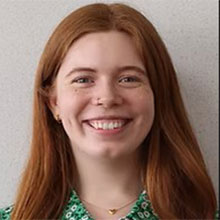
Jessamy Riley
I am a PhD student on the EPSRC Process Industries for Net Zero (PINZ) CDT, supervised by Dr Terry Dillon and Professor Helen Sneddon. Based in the Green Chemistry and Atmospheric Chemistry research groups, my PhD focuses on ethyl lactate, its performance as a green solvent, and its impact on air quality. I completed a BSc in Petroleum Chemistry in Nigeria, working in materials chemistry for the degradation of petroleum hydrocarbons and an MSc in Green Chemistry and Sustainable Industrial Technology at the University of York on hydrogels for platinum remediation. Outside of my research, I enjoy community outreach and science communication.
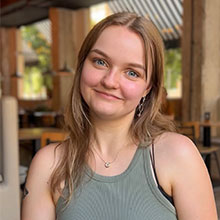
Helena Roalfe
Helena graduated from the University of York in 2023, before working in the Laboratory Teaching Team at the University of Warwick. At Warwick, she worked on developing new experiments for the undergraduate curriculum, with a focus on organic synthesis and polymers. She is now part of the Synthomer prosperity project under the co-supervision of Professor Antoine Buchard and Professor Helen Sneddon. In her spare time, Helena enjoys climbing and visiting new coffee shops.

Emily Tyson
Emily completed her MChem at the University of York in 2023. Her Master’s research focused on the synthesis of naturally-occurring biologically active pyrrolizidine alkaloids under the supervision of Professor Paul Clarke and Dr Luke Wilkinson. She is co-supervised by Professor Helen Sneddon and works on the development of new bio-based monomers, in collaboration with Synthomer. In her free time, Emily enjoys reading, walking and listening to music.
